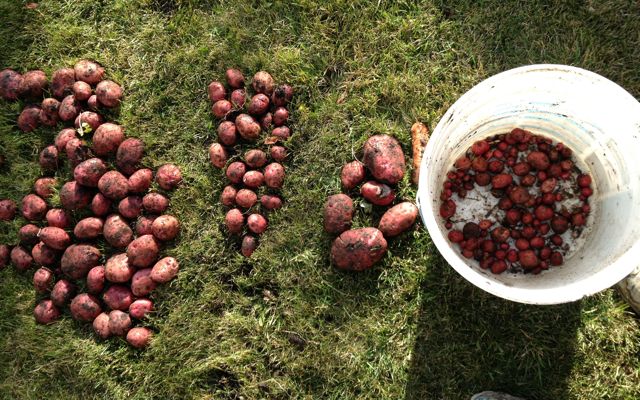…continued from September 1/2014
 I notice that my appetite has diminished. I grew up a farm girl and I’ve always had the appetite of a hired hand, proudly able to keep up with my brother or my dad when it comes to putting away a piled up plate of food. I am also less prone to snacking in the evenings.
I notice that my appetite has diminished. I grew up a farm girl and I’ve always had the appetite of a hired hand, proudly able to keep up with my brother or my dad when it comes to putting away a piled up plate of food. I am also less prone to snacking in the evenings.
And the scale continues to show it. Five months into the “experiment” I am down 30 pounds.
I notice my knees no longer crackle when I climb stairs, something that I had heard off and on since my 20’s. It makes sense. Sugar causes inflammation, which leads to lots of debilitating diseases like arthritis, perhaps even crackling knees!
I also notice that I have no pain. I spend one weekend moving ten pickup truck loads of furniture with my daughter. The old me would have been unable to get out of bed the next day with stiffness and soreness from using muscles that are usually inert. But I have no pain.
I have not had a headache, backache or any other body-part-ache since stopping sugar. I no longer keep over the counter pain medication in my home. It is not relevant.
Before stopping sugar I had done a hormone profile in an effort to address post-menopausal symptoms like hot flashes and night sweats. Four of the five hormones they measure were so low they didn’t register. I didn’t know it because I forgot to get my results until June. When I went for the results I suggested that I should redo the profile given that I was feeling so different. We did another profile.
The results were astonishing. All my hormones were in the middle of the normal range. My health care professional was astounded that removing sugar could make such a profound difference.
I am very happy about my own results but also sad to know that so many women are on risky Hormone Replacement Therapy when one simple change in their diets could bring them relief. And so many other benefits.
Altogether I lost 35 pounds, stabilizing in the last six months at the ideal weight for my height, a goal I have only achieved a couple times in my life and with great effort. This has been virtually effortless. My goal was not weight loss but I am happy to experience that benefit.
I am amazed by my energy. My husband says, “How old would you be if you didn’t know how old you are?” Right now, I have to say 30! That is almost half my age. I know I can outrun and outwork most 30-year-olds. I keep up with my granddaughters (grandtoys) biking and hiking.
People often comment that I don’t look like a grandmother. I’ve started to reply, “I eat right” and I am amazed by how people are taken aback at this simple mantra.
Many people say, “Oh, I could never give up sugar!” I used to think that too.
I didn’t do it overnight. For years I was oblivious to the need for eliminating sugar, believing cutting back was good enough. It was a good start and looking back, it prepared me for quitting. It simply wasn’t enough.
I learned that it doesn’t take much of this poison to cause crazy things to happen to your body. I never would have experienced all those benefits if I had not given up sugar entirely.
You might have great success simply by cutting down on sugar. I have to give it up because I can’t eat just one cookie; I need the whole bag. I can’t eat a two-inch piece of cake; it ends up being six inches! Remember my doughnut story? I am a sugar addict. One doesn’t need to drink alcohol to be an alcoholic. (Incidentally, I suspect alcoholism is a sugar addiction).
Currently, sugar has little appeal. In fact, I think it stinks. I never thought sugar smelled but since I’m off it I can smell a chemical/plastic odor when I’m in the presence of doughnuts, candy or cake.
I now find sweet fruits like pineapple, grapes and ripe bananas too sweet to eat. In the last few months, I’ve eaten less fruit. Mostly, it’s a snack or a treat once or twice a day. I usually gorge on in-season fruits like cherries. We’ll see if I have the same appetite for them this year.
Many people ask me about sugar substitutes. I avoid them (the sugar substitutes, not the people asking me!) as they all fall under the processed food category. There is evidence that the body doesn’t quite know what to do with fake sugars (and other fake foods). They are suspected of contributing to, not preventing, as they claim, obesity. Even more alarming, sugar substitutes are implicit in the diabetes epidemic.
“What about in your tea and coffee?” I am frequently asked. I never was a coffee fan and I drink herbal teas that have an implied sweetness like mint or some of the fruit blends, without honey or sugar. I most often drink hot water with lemon. Lemon helps the liver (which is affected by sugar and other chemicals in our food and water.) If you sweeten your beverages, gradually cut back then switch to a small amount of stevia, maple syrup or honey. Eventually you will do without.
“I’m okay. I drink Diet Coke,“ some folks assure me if the topic of sugar arises. I don’t always get into it but they think it’s a good thing to have sugar-free drinks. I do not. Aspartame is a known neurotoxin. Evidence points to its contribution to Gulf War Syndrome, Multiple Sclerosis, even some cases of Parkinson’s Disease.
Trading one toxin for another possibly more dangerous toxin does not make sense. Yet my friends send me recipes calling for Sucralose or Cool Whip (fake fat with fake sugar) and they drink Diet Coke! (If it’s not diet, it might be sweetened with high fructose corn syrup another unfood that the body doesn’t know how to process. All sodas contain phosphoric acid, which essentially leeches calcium from your bones).
One of the most dangerous things about sugar is that it is everywhere, in almost every processed food. When we embraced low-fat diets, manufacturers substituted sugar for the fat. To avoid sugar successfully, one must avoid processed foods. They may not seem to have much sugar but manufacturers trick us by using several different sugars. That way, they appear lower down on the ingredients list, leading the consumer to believe that sugar is not the main ingredient, when in fact, it is.
How much sugar is too much? Recently the World Health Organization slashed their recommended limit of sugar calories to 5% from 10% of the diet. The new levels equate to three teaspoons for women and five for men per day. For perspective, a bowl of cereal or a half-cup serving of yogurt typically contain six teaspoons of sugar. A can of Coke has ten teaspoons of sugar, two days’ allotment for men, three days’ for women!
The average North American consumes 22 teaspoons of sugar each day; the average child, 32 teaspoons each day! Then we wonder about the scary cancer statistics threatening that one in two of us will develop cancer in our lives.
Why don’t these stats come partnered with the message that sugar feeds cancer and that when sugar is removed from the diet, tumors shrink? Why? Because food manufacturers and lobbyists don’t want consumers to know that their products are killing them.
We never hear that cutting sugar decreases our risk of heart disease because inflammation, (not cholesterol) is the cause of heart disease. Sugar causes inflammation. And statin drugs (anti-cholesterol) are some of the most profitable pharmaceuticals invented, so nobody wants to step forward to say “stop eating sugar and you won’t need this medication”.
Astoundingly, the sickness care business is oblivious to sugar’s role in the mushrooming diabetes rates, affecting younger and younger children. Type II diabetes was once called “adult-onset diabetes” but so many kids have it, that name no longer accurately describes the condition. Sadly, much money is made on diabetes treatments and monitoring, and the health companies aren’t about to start telling us the truth about why we have diabetes.
I believe most cases of diabetes could be prevented if we eliminated processed food and sugar from the diet. A few years ago an experiment was conducted at the London Zoo. A number of volunteers were confined to the zoo and fed what a gorilla would eat: up to ten kilograms of raw fruits, vegetables, seeds and nuts each day. After one month the results were incredible. All participants lost weight. Many had to get off their medications for diabetes and heart disease. They enjoyed many other surprising health benefits.
Some online searching will reveal many success stories of people going back to eating the way nature intended: whole real food. People have cured themselves of cancer, diabetes and heart disease, the big killers, and a host of other ailments by adjusting their diet. We don’t hear about these miracles because there is no money to be made treating disease with food.
Not every eating plan works for every person. You can’t go wrong with eating simple foods, mostly raw, mostly plants and not too much of anything.
I strongly recommend you weed out the processed sugar (and even the fruit sugar if you’re overdoing it). I suspect you will be surprised and delighted with the changes you’ll see in your body and how you feel in general.
I am personally astounded by the magnitude of the changes in my body and overall feeling of good health and energy simply because I consciously eliminated processed sugar from my diet.
Good health is a journey. We are all on different places on the path. I feel like I am many steps closer to my goal of optimum health because I gave up sugar. Knowing what I know now, I am convinced I will never go back to consuming copious amounts of sugar like I once did.
I have discovered that sugar isn’t so sweet after all.




